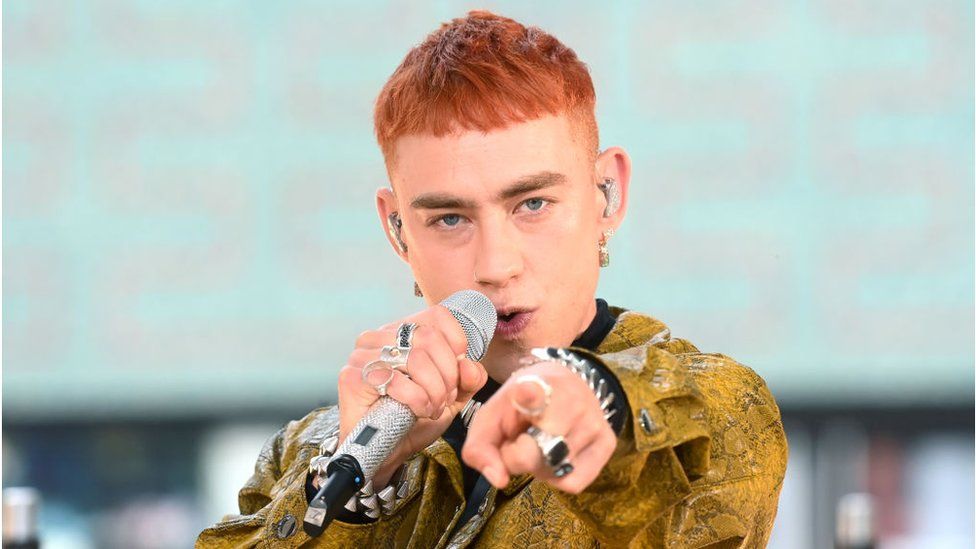Eurovision: Olly Alexander rejects boycott call over Israel-Gaza war
- Published

Olly Alexander has rejected calls to pull out of the Eurovision Song Contest in protest against Israel's inclusion.
The UK's entrant for this year's competition expressed his wish for peace, but said he believes in the unifying power of music.
He was responding to an open letter by more than 450 LGBTQ artists, individuals and groups urging him to boycott the event over the Gaza war.
The contest is taking place in May in Malmo, Sweden.
In a post on X, formerly Twitter, Alexander explained why he believes it is the right decision to stay in the competition.
"As a participant I've taken a lot of time to deliberate over what to do and the options available to me," he wrote.
"It is my current belief that removing myself from the contest wouldn't bring us any closer to our shared goal."
Alexander said he had been speaking to some of the other Eurovision contestants, and they had agreed that by taking part in the contest, they could use their platform "to come together and call for peace".
The It's A Sin actor added that he "wholeheartedly" supported action being taken to demand a ceasefire in Gaza, as well as the return of all hostages.
"I hope and pray that our calls are answered and there is an end to the atrocities we are seeing taking place in Gaza."
It is understood that Alexander was not speaking on behalf of the BBC and he did not break the broadcaster's social media guidelines.
The International Court of Justice has been asked to consider whether Israel is committing genocide against Palestinians in Gaza.
Israel rejects the allegations as "baseless" and its military says it takes a raft of measures to avoid civilian casualties.
The current conflict began after the 7 October attack, which saw Hamas-led gunmen cross the border into Israel, killing around 1,200 people and taking more than 250 others hostage.
Of those taken, about 130 remain unaccounted for, at least 34 of whom are presumed dead.
Gaza's Hamas-run health ministry says Israel's retaliatory campaign has killed at least 32,623 people.
Earlier on Friday, Alexander shared another statement on social media, issued together with eight other Eurovision contestants, which also rejected calls to boycott the competition.
"We firmly believe in the unifying power of music, enabling people to transcend differences and foster meaningful conversations and connections," the artists wrote.
Irish hopeful Bambie Thug, Norway's Gate, and the Danish entrant Saba were among the signatories to the statement.
On Friday, a group called Queers for Palestine wrote an open letter on Instagram, calling on Alexander to not perform his dance track Dizzy in Malmo, Sweden, amid the conflict in Gaza.
It said signatories included actors Indya Moore and Maxine Peake, and the novelist Sarah Schulman.
The letter read: "We share the vision of queer joy and abundance you've offered through your music, and share your belief in collective liberation for all. In this spirit, we ask you to heed the Palestinian call to withdraw from Eurovision."
Responding to Alexander and the other Eurovision contestants statements' on Saturday, the group urged the singers to reconsider.
"The most powerful use of Olly's voice at this moment would be to use it to announce his withdrawal from Eurovision," they wrote on Instagram.
Before he was selected to represent the UK, Alexander endorsed a statement accusing Israel of genocide.
An Israeli official later told the Daily Telegraph newspaper the arguments were "absurd" and accused Alexander and his fellow signatories of "anti-Israel bias".
Earlier this month, Israel unveiled its revised entry for the Eurovision Song Contest, after the original version was rejected for its perceived political overtones.
Eden Golan will now sing Hurricane, a rewritten version of October Rain, which was thought to reference the 7 October Hamas attack.
Israel has won the Eurovision Song Contest four times before.
In response to Alexander's statement, Eurovision organisers the European Broadcasting Union said: "We firmly believe that the Eurovision Song Contest is a platform that should always transcend politics, promote togetherness and bring audiences together across the world."
It added it believes in "the unifying power of music", summed up in its slogan: 'United By Music'.
Related Topics
- Published11 March
- Published7 March
- Published29 March